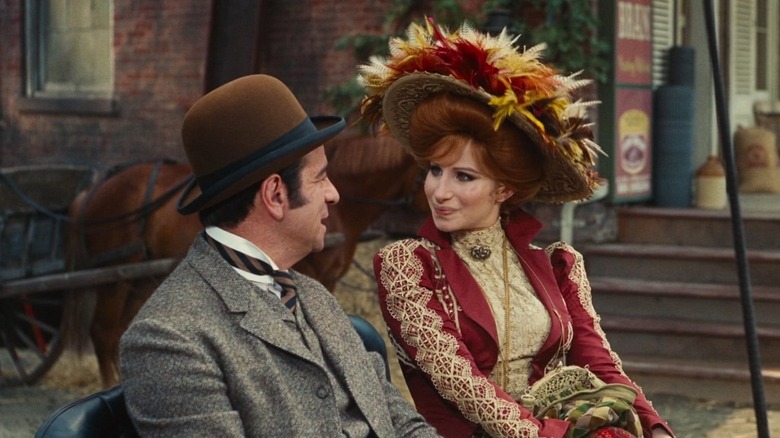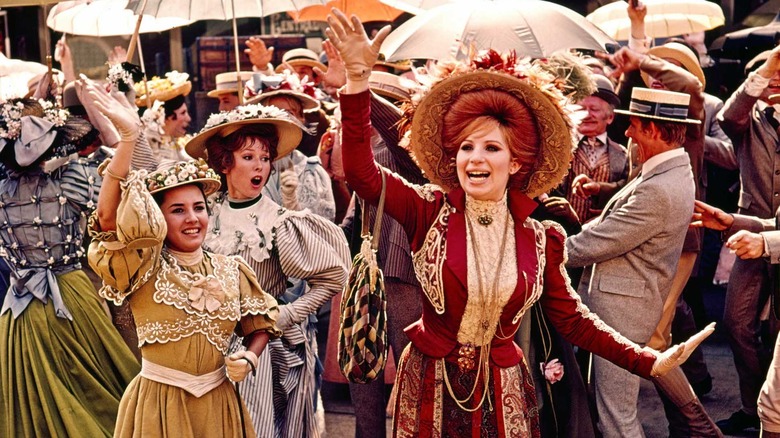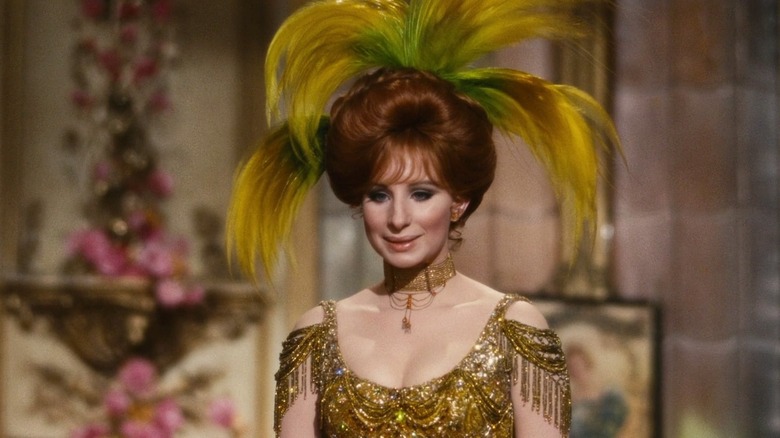The Failed Fox Studios Film That Barbra Streisand Tried To Escape
The original 1964 Broadway production of "Hello, Dolly!" was considered a showcase for its star, Carol Channing, and little else. At the time, critics were not entirely kind, saying the show had "unnecessary vulgar and frenzied touches," and that they "wouldn't say that Jerry Herman's score is memorable." Despite the middling reviews, "Hello, Dolly!" won 10 Tony Awards, including Best Musical, Best Leading Actress (for Channing), Best Direction, Best Choreography, and Best Original Score.
The mid-'60s were a weirdly fraught time for major Hollywood musicals, as the genre provided some of the era's biggest hits, but also some of its biggest bombs. In 1964, Disney had a big hit with "Mary Poppins" and Warner Bros. made bank with "My Fair Lady," so musicals were suddenly on the rise. In 1965, Fox released "The Sound of Music," adapted from the stage production by Rodgers and Hammerstein, and it proved to be one of the biggest movies of all time. It still is. When adjusted for inflation, "The Sound of Music" is the sixth-highest-grossing film of all time, earning just a little less than "Avengers: Endgame," but a little more than "E.T. the Extra-Terrestrial."
The one-two-three punch of "Mary Poppins," "My Fair Lady," and "The Sound of Music" not only were huge hits but were nominated for 35 Oscars between the three of them. Hollywood began scrambling to make their own high-profile musicals. Given that "Hello Dolly!" was such a hit on Broadway, it seemed like the logical place to go.
Both Hollywood and "Hello Dolly!" lead actress Barbra Streisand soon learned that the above films may have been a fluke and not a trend. In a 2018 retrospective on 20th Century Fox printed in the Hollywood Reporter, Streisand's old memories of trying to wriggle out of "Hello Dolly!" were revived. She did not want to make that film.
The post-Music bombs
In the years that followed "The Sound of Music," several studios continued to release outsize, big-budget movie musicals in the roadshow format; that is: a major production would open only in major cities, and then the prints would spend the rest of the year "touring" smaller and smaller cities, sometimes taking months or even a year to reach the end of the circuit. This release format made sure certain movies not only built up a lot of buzz but remained profitable for extended periods. Nationwide releases wouldn't become fashionable until the release of "Jaws" in 1975. In that post-"Sound of Music" glut, studios released multiple not-very-well-received "prestige" musicals like "The Happiest Millionaire," "Camelot," "Finnian's Rainbow," "Man of La Mancha," "Star!," "Paint Your Wagon," and the entirely misguided "Doctor Doolittle." The market was flooded.
The biggest flop of them all was director Gene Kelly's "Hello, Dolly!" a musical that was released in 1969 and cost a then-unprecedented $25 million. The 25-year-old Streisand was miscast as a middle-aged woman, a choice that was considered risible, even at the time. What's more, Walter Matthau was cast as her love interest, and he was in his mid-40s at the time. The trend was dying and Streisand knew it. She was quoted in The Hollywood Reporter as saying:
"I thought I was too young to play Dolly. [...] I thought they should've used an older woman, and I talked to [my manager] Marty [Erlichman] and said, 'Can I get out of this? 'Cause I don't even understand the pairing of me and Walter Matthau. It's not romantic. Nobody's gonna root for us to be together.'"
Indeed they didn't. "Hello, Dolly!" landed with a wet thud at the box office.
The evolution away from musicals
The Hollywood Reporter noted that "Hello, Dolly!" lost the studio $10 million, a huge amount at the time. It's also worth noting that by the late 1960s, as Hollywood execs were still trying to ride the a trend into the ground, new filmmakers rose up to lead a new conversation. "Five Easy Pieces," "Bonnie and Clyde," "A Hard Day's Night," and several other smaller, more daring, more creative movies started to dominate the consciousness. Sure, there were a few more musical hits here and there ("Fiddler on the Roof" and "Oliver!" especially), but it wouldn't be long before a grim, raw, X-rated film like "Midnight Cowboy" would win Best Picture at the Academy Awards ... beating out "Hello, Dolly!" If ever there was a symbol for where Hollywood was in 1969, that's probably it.
If one wishes to draw a parallel narrative between 1960s Hollywood musicals and 2010s superhero movies, I encourage it. These things come in waves.
Streisand was likely more concerned with whether or not "Hello, Dolly!" would function as a drama more than she was with dominant Hollywood trends, but either way, she was a victim of the Hollywood blockbuster machine. Luckily, the failure of "Hello, Dolly!" did nothing to slow Streisand's amazing career, starring in "The Owl and the Pussycat" in 1970 and "What's Up, Doc?" — one of the funniest movies of all time — in 1972. She also has two Oscars, five Emmys, nine Grammys (including an induction into the Hall of Fame), a Tony, and nine Golden Globes.
Yeah, she came out fine.


